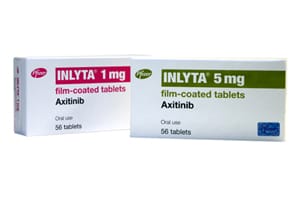 Patients in Scotland will be the first in the UK able to be guaranteed access to Pfizer’s new kidney cancer drug Inlyta under the NHS after it was approved by the Scottish Medicines Consortium (SMC).
Patients in Scotland will be the first in the UK able to be guaranteed access to Pfizer’s new kidney cancer drug Inlyta under the NHS after it was approved by the Scottish Medicines Consortium (SMC).
The cost-effectiveness watchdog gave its blessing to Inlyta (axitinib) for renal cell carcinoma as a second-line treatment for adults – after failure of prior treatment with Pfizer’s Sutent (sunitinib) or a cytokine – in its latest round of reviews.
Once again, however, the ruling reveals disparities in patient access to healthcare across the UK, with patients south of the border having to try their luck getting access to it via the Cancer Drugs Fund (CDF), which was extended until March 2016 at the end of September.
Earlier this year, the National Institute for Health and Care Excellence (NICE) confirmed earlier draft guidance indicating it could not recommend funding Inlyta treatment by the NHS after concluding that it would not be a cost effective use of resources.
The SMC said it had taken into account a patient access scheme (PAS) set up by Pfizer that provides the drug at a discounted price and that, “despite a number of uncertainties”, axitinib’s value for money was acceptable.
Its review notes that “axitinib improved progression-free survival (PFS) by two months compared with another targeted therapy when used after first-line sunitinib or a cytokine”, although it adds there was no benefit on overall survival.
At the time the CDF was extended, Pfizer said the UK government’s move was a “clear signal that NICE is not working”, pointing out that the agency had not recommended any of the eleven new cancer medicines that had been appraised by the end of September. It reiterated that position in comments on the new Pharmaceutical Price Regulation Scheme (PPRS) last week.
Meanwhile, the SMC also backed use of Astellas’ prostate cancer treatment Xtandi (enzalutamide) – which was also recommended for use by patients in England and Wales in draft NICE guidance published last month – along with Roche’s Lucentis (ranibizumab) for pathologic myopia and Eli Lilly’s attention deficit hyperactivity disorder (ADHD) therapy Strattera (atomoxetine) .
The Scottish agency concurred with earlier NICE guidance however and did not support the use of Pfizer’s Bosulif (bosutinib) as a back-up treatment for chronic phase, accelerated phase, and blast phase Philadelphia chromosome-positive chronic myelogenous leukaemia (CML).




